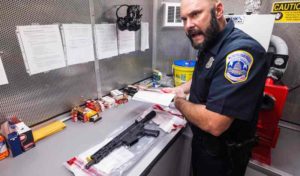
Firearm investigative resource unveiled in Virginia.
Amid the ongoing debate over gun-control laws, Virginia has become the first state to establish an internet-based firearms tracing program to help state and local law enforcement officials. Pioneering an instantly accessible gun-tracing system, twenty-five Virginia law enforcement agencies have opted into the program, which shares firearms data retrieved from local criminal investigations with other jurisdictions.
The program, which began eight-weeks ago, is modeled after the Bureau of Alcohol, Tobacco, Firearms, and Explosives (ATF) eTrace program but differs in some respects.
Law enforcement officials currently rely on the federal eTrace database to find retail and wholesale gun sources that are connected to criminal investigations. The ATF’s National Tracing Center, located in Martinsburg, West Virginia, centralizes gun-tracing data to establish links among criminal investigations in multiple jurisdictions. This database is accessible to both U.S. and foreign law enforcement agencies. However, unlike Virginia’s new system, ATF agents must conduct searches of the federal registry manually. Federal law prevents the ATF from creating a electronic database.
Furthermore, the level of detail provided by eTrace database searches is limited due to federal restrictions. For example, a detective may use the ATF’s eTrace and find a link to his case, such as a common retailer, owner, or possessor, but he must then submit a request to the other jurisdiction to obtain more detailed information on the queries. This extra step does not deter approximately 4400 local law enforcement agencies and 34 foreign countries that “actively” use eTrace, but the Virginia program seeks to improve upon the accessibility of such information.
Virginia’s statewide program bypasses the extra step in the ATF database by giving the agencies the choice to share and receive information. Instead of using the ATF’s eTrace system, Virginia law enforcement agencies “directly and electronically” share gun-tracing information based on queries with “common purchaser, possessor, firearms dealer or recovery location.” Thus, a detective may have instant access to important gun-tracing data in another county because his police department chose to share its own gun-tracing data through the Virginia program.
Directors of the Virginia eTrace system expect more local law enforcement agencies to opt-in, adding to the information available through the gun-tracing database. And following the initial launch, program directors and ATF authorities are lining up Illinois and Maryland to adopt similar programs.
Expansion to multiple states would allow local agencies to share crime-related firearms data across state lines, a goal the ATF tried to achieve through its eTrace system. Interstate information sharing would further expand the database, giving police investigators more information upon which to solve firearms crimes.
Some oppose the ready availability of firearms data, which includes distributor and retailer information. These opponents warn against easy data access given the potential for abuse. Congress has heeded these warnings, adopting various versions of the Tiahrt amendment in appropriations acts. The Tiahrt amendments restrict the ATF from distributing its gun-tracing data. The National Rifle Association supported these amendments, citing the need to protect wholesalers, retailers, and gun owners uninvolved in gun-related crimes.
Some law enforcement agencies are also wary of these programs due to the sensitive nature of their investigations and the need to protect the safety of their undercover officers. These concerns and restrictions are evident in the ATF’s sample Memorandum of Understanding for foreign countries, which contains warnings about the “premature disclosure of . . . sensitive information” and requires ATF consent for all disclosures.
Even in the midst of a heated national gun-control debate, law enforcement agencies have found a means to collect and use data to support their investigative work. While Congress restricts the centralization and distribution of gun-tracing data, Virginia’s local and state police departments, and soon Illinois’ and Maryland’s law enforcement agencies, seek to expand the network of information available for their investigations. It remains to be seen how this conflict between state legislatures and law enforcement agencies will be resolved.
Currently, federal restrictions on the ATF eTrace program remain in place. Congressional intervention is still pending through proposals to repeal the budgetary restrictions on data collection and centralization.



